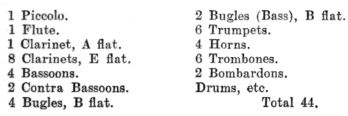Military Music And Its Story - online book
The Rise & Development Of Military Music
| Share page | Visit Us On FB |
|
REORGANISATION. 109 |
||
|
them. At any rate, bandmasters had no military standing, something like the position held by the same rank in our service, prior to the establishment of Kneller Hall. It was owing to the non-official position of these bandmasters that a "Pension Society for Austrian Army Bandmasters" was established in the middle of the last century. Austria's most noteworthy bandmasters of the period were : Starke (1774-1835), J. Sawerthal (1819-1903), V. H. Zavertal (1821-73) and Farbach.
The following is a specimen band of the Austrian infantry of the period (1848) :9
 In France, reorganisation of military bands followed closely after that of Prussia. In 1845 a special commission which included Spontini, Auber, Halevy, Adam, Onslow and Carafa among the musical experts, with Kastner as secretary, was formed to consider the question. They attributed the bad state of their military bands to: (1) The suppression of engaged professional men; (2) use of inferior instruments; (3) indifferent instrumental combinations; (4) insufficient number of executants; (5) the inferior position held by the latter. |
||
|
'Kastner, "Manuel General de Musique Militaire," 1848. |
||